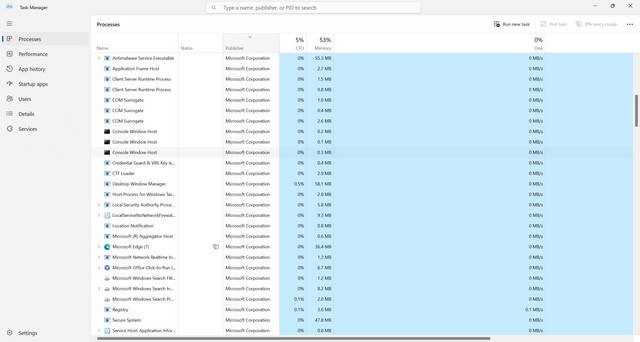When you open the Task Manager on your Windows computer, you may notice a process called “System” running in the background. This process is an essential part of the operating system and plays a crucial role in maintaining the stability and functionality of your computer. In this article, we will explore why the System process is running in Task Manager and its significance in the overall system operation.

Understanding the System Process
The System process, also known as System Idle Process, is a fundamental component of the Windows operating system. It is responsible for managing various system-level operations and resources, ensuring the smooth execution of critical tasks. The System process has a unique process ID (PID) of 4, making it one of the first processes to start when your computer boots up.
The primary purpose of the System process is to handle system-level threads and processes that are essential for the functioning of the operating system. It manages hardware resources, such as memory, disk operations, and input/output (I/O) operations. Additionally, it handles system interrupts, which are signals generated by hardware devices to gain the attention of the CPU.
Why is the System Process Running?
The System process is always running in the background because it is responsible for maintaining the core functionality of the operating system. It ensures that critical system services and processes are running smoothly and efficiently. Here are some specific reasons why the System process is running:
- Idle CPU Time: The System process represents the idle time of the CPU. When your computer is not actively running any tasks, the CPU is considered idle, and the System process takes up the CPU resources. It indicates that the CPU is available for other processes and is not overloaded.
- System Services: The System process hosts various system services that are necessary for the proper functioning of the operating system. These services include device drivers, network services, security components, and other critical system processes. The System process ensures that these services are running and accessible to other applications.
- Interrupt Handling: The System process handles interrupts generated by hardware devices. When a device sends an interrupt signal to the CPU, the System process is responsible for processing and responding to the interrupt. This allows the operating system to interact with hardware devices and perform necessary actions.
- Memory Management: The System process manages the allocation and deallocation of memory resources. It ensures that applications have access to the required memory and optimizes memory usage to prevent system slowdowns or crashes. The System process also handles virtual memory management, which allows the operating system to use disk space as an extension of physical memory.
Identifying Issues with the System Process
In most cases, the System process running in Task Manager is a normal and expected behavior. However, there are instances where the System process may consume excessive CPU or memory resources, indicating a potential issue. Here are some common issues related to the System process:
- High CPU Usage: If the System process consistently uses a significant portion of the CPU resources, it may indicate a problem. High CPU usage by the System process can be caused by faulty device drivers, malware infections, or software conflicts. It is recommended to scan your computer for viruses or malware using Malwarebytes Free and update your device drivers to resolve the issue.
- Memory Leaks: The System process may occasionally experience memory leaks, where it gradually consumes more memory over time. Memory leaks can lead to system slowdowns and instability. To address memory leaks, it is advisable to install the latest Windows updates, as Microsoft often releases patches to fix such issues.
- Hardware Issues: In some cases, problems with hardware components can cause the System process to behave abnormally. Faulty RAM modules, hard drives, or other hardware components can lead to system instability and performance issues. If you suspect hardware problems, it is recommended to run diagnostic tests or consult a professional technician.
Conclusion
The System process running in Task Manager is an integral part of the Windows operating system. It ensures the smooth functioning of critical system services, manages hardware resources, and handles system interrupts. While the System process is typically normal and expected, issues such as high CPU usage or memory leaks may indicate underlying problems that require attention.
If you encounter any abnormal behavior related to the System process, it is advisable to scan your computer for viruses or malware using Malwarebytes Free and keep your device drivers up to date. Additionally, staying updated with the latest Windows patches and addressing hardware issues can help maintain the stability and performance of your computer.



